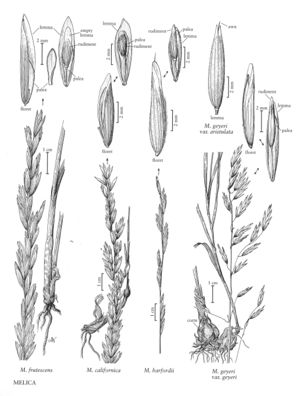Difference between revisions of "Melica harfordii"
FNA>Volume Importer |
imported>Volume Importer |
||
| (4 intermediate revisions by 2 users not shown) | |||
| Line 4: | Line 4: | ||
|publications= | |publications= | ||
|common_names=Harford melic | |common_names=Harford melic | ||
| + | |special_status={{Treatment/ID/Special_status | ||
| + | |code=E | ||
| + | |label=Endemic | ||
| + | }} | ||
|basionyms= | |basionyms= | ||
|synonyms={{Treatment/ID/Synonym | |synonyms={{Treatment/ID/Synonym | ||
|name=Melica harfordii var. viridifolia | |name=Melica harfordii var. viridifolia | ||
| − | |authority= | + | |authority= |
| + | |rank=variety | ||
}} {{Treatment/ID/Synonym | }} {{Treatment/ID/Synonym | ||
|name=Melica harfordii var. tenuis | |name=Melica harfordii var. tenuis | ||
| − | |authority= | + | |authority= |
| + | |rank=variety | ||
}} {{Treatment/ID/Synonym | }} {{Treatment/ID/Synonym | ||
|name=Melica harfordii var. minor | |name=Melica harfordii var. minor | ||
| − | |authority= | + | |authority= |
| + | |rank=variety | ||
}} | }} | ||
|hierarchy=Poaceae;Poaceae subfam. Pooideae;Poaceae tribe Meliceae;Melica;Melica harfordii | |hierarchy=Poaceae;Poaceae subfam. Pooideae;Poaceae tribe Meliceae;Melica;Melica harfordii | ||
| Line 26: | Line 33: | ||
-->{{Treatment/Body | -->{{Treatment/Body | ||
|distribution=Calif.;Oreg.;Wash.;B.C. | |distribution=Calif.;Oreg.;Wash.;B.C. | ||
| − | |discussion=<p>Melica harfordii grows primarily in the Pacific coast ranges from Washington to California, as well as in the Sierra Nevada and a few other inland locations, usually on dry slopes or in dry, open woods. The awns in M. harfordii often escape attention because they do not always extend beyond the lemma.</p> | + | |discussion=<p><i>Melica harfordii</i> grows primarily in the Pacific coast ranges from Washington to California, as well as in the Sierra <i>Nevada</i> and a few other inland locations, usually on dry slopes or in dry, open woods. The awns in <i>M. harfordii</i> often escape attention because they do not always extend beyond the lemma.</p> |
|tables= | |tables= | ||
|references= | |references= | ||
| Line 35: | Line 42: | ||
-->{{#Taxon: | -->{{#Taxon: | ||
name=Melica harfordii | name=Melica harfordii | ||
| − | |||
|authority=Bol. | |authority=Bol. | ||
|rank=species | |rank=species | ||
| Line 42: | Line 48: | ||
|basionyms= | |basionyms= | ||
|family=Poaceae | |family=Poaceae | ||
| − | |illustrator=Linda | + | |illustrator=Linda Ann Vorobik |
| + | |illustration copyright=Utah State University | ||
|distribution=Calif.;Oreg.;Wash.;B.C. | |distribution=Calif.;Oreg.;Wash.;B.C. | ||
|reference=None | |reference=None | ||
|publication title= | |publication title= | ||
|publication year= | |publication year= | ||
| − | |special status= | + | |special status=Endemic |
| − | |source xml=https:// | + | |source xml=https://bitbucket.org/aafc-mbb/fna-data-curation/src/200273ad09963decb8fc72550212de541d86569d/coarse_grained_fna_xml/V24/V24_112.xml |
|subfamily=Poaceae subfam. Pooideae | |subfamily=Poaceae subfam. Pooideae | ||
|tribe=Poaceae tribe Meliceae | |tribe=Poaceae tribe Meliceae | ||
Latest revision as of 16:22, 11 May 2021
Plants cespitose, not rhizomatous. Culms 35-120 cm, not forming corms; internodes smooth. Sheaths glabrous or pilose, often most pilose at the throat and collar; ligules 0.5-1.5 mm; blades 1.5-4.5 mm wide, abaxial surfaces smooth, adaxial surfaces scabridulous, glabrous or puberulent. Panicles 6-25 cm; branches 3-8 cm, appressed, with 2-6 spikelets; pedicels straight; disarticulation above the glumes. Spikelets 7-20 mm, with 2-6 bisexual florets; rachilla internodes 2-2.4 mm. Glumes obtuse to subacute; lower glumes 4-10 mm long, 1.5-2.5 mm wide, 3-5-veined; upper glumes 5-11 mm long, 1.8-2.5 mm wide, 5-7-veined; lemmas 6-16 mm, hairy, hairs to 0.75 mm on the back, 0.7-1.3 mm on the margins, 9-11-veined, veins inconspicuous, apices mucronate to rounded, usually awned, awns 0.5-3 mm, fragile; paleas about 3/4 as long as to nearly equaling the length of the lemmas; anthers 3, 2.2-4 mm; rudiments 2.5-6 mm, tapering, resembling the bisexual florets. Caryopses about 5 mm. 2n =18.
Distribution
Calif., Oreg., Wash., B.C.
Discussion
Melica harfordii grows primarily in the Pacific coast ranges from Washington to California, as well as in the Sierra Nevada and a few other inland locations, usually on dry slopes or in dry, open woods. The awns in M. harfordii often escape attention because they do not always extend beyond the lemma.
Selected References
None.
